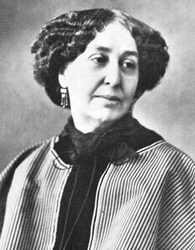She may have adopted a male name and male attire, but French novelist Amandine-Aurore-Lucile Dupin, aka George Sand, moved female emancipation and independence forward through her writing and lifestyle. Her romantic novels were rivaled only by her numerous love affairs with men including Frédéric Chopin.
George Sand’s Early Days
George Sand was born Amandine-Aurore-Lucile Dupin on July 1, 1804, in Paris. She spent most of her girlhood in the countryside at her grandmother’s estate of Nohant. Although she later had a sophisticated and aristocratic air, the simplicity of this rural setting remained with her as a source of literary inspiration.
After a brief stint in a convent in Paris, Aurore married Baron Casimir Dudevant in 1822 and bore him a son and daughter, but her extramarital liaisons began even before her daughter was born. She began publishing articles in Le Figaro written with her lover, novelist Jules Sandeau. The two novels she published with him, “Prima Donna” and “Rose et Blanche,” using a pseudonym adapted from his name, Jules Sand, launched her literary career.
Sources in this Story
- Encyclopedia Britannica: George Sand
- NNDB: George Sand
- Mount Holyoke College: The France of Victor Hugo: Women: Conformity vs. Resistance: George Sand
- The New York Times: Sunday Book Review: All for Love
Sand’s Writing
Sand’s next novel, “Indiana,” was solely her own and the first for which she adopted her famous moniker. It catapulted her to instant fame. Sand had turned to writing as a means to supplement the meager allowance she was granted after separating from her husband; ironically, this tale of an unhappy woman who abandons her marriage to find love made her financially independent.
Sand embarked on an extraordinarily prolific writing career that included novels, plays, innumerable political tracts as well as letters, journals and memoirs. Her later plays and novels were considered “of impeccable morality and conservatism,” according to Encyclopedia Britannica.
She also amassed almost as many lovers, being as egalitarian in her tastes as her upbringing afforded. They included French poet, playwright and novelist Alfred de Musset; a Venetian doctor who treated Musset; and Polish composer Frédéric Chopin. Sand is often cited for the quote, “There is only one happiness in life, to love and be loved.”
The Woman and Her Work
- “Naked in the Marketplace: The Lives of George Sand” by Benita Eisler
- “Impromptu” directed by James Lapine
The Rest of the Story
Sand died on June 8, 1876, at the country idyll that was her beloved Nohant. She had lived outside convention, often dressing in men’s clothes, and had given women a new sense of self-worth though her life and the “intelligent and morally sound” heroines of her books.
Sand’s love affairs have become the stuff of silver screen legend, and she has been portrayed over the years by formidable actresses such as Merle Oberon, Rosemary Harris and Judy Davis.
In a study of her life, “Naked in the Marketplace,” her biographer Benita Eisler wrote that Sand is remembered more for her life than her art. One of her rare platonic relationships was with Gustave Flaubert, who wrote to her in a letter, “It astonishes me that you haven’t died 20 times, you’ve thought so much, written so much, suffered so much.”











